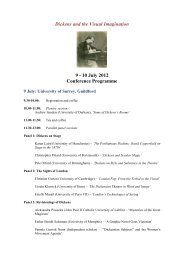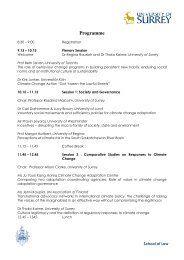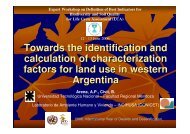The targeted killing of terrorists on foreign soil - Institute of Advanced ...
The targeted killing of terrorists on foreign soil - Institute of Advanced ...
The targeted killing of terrorists on foreign soil - Institute of Advanced ...
Create successful ePaper yourself
Turn your PDF publications into a flip-book with our unique Google optimized e-Paper software.
Tobias Ruettersh<str<strong>on</strong>g>of</str<strong>on</strong>g>f<br />
Panel 4 (a)<br />
holds the danger that the situati<strong>on</strong> gets out <str<strong>on</strong>g>of</str<strong>on</strong>g> hand, no matter how large it is. Thus, Article 2<br />
(4) not <strong>on</strong>ly covers large-scale military operati<strong>on</strong>s but also small scale force with military<br />
means (see Schmitz-Elvenich 2007, 39). Applied to the <str<strong>on</strong>g>targeted</str<strong>on</strong>g> <str<strong>on</strong>g>killing</str<strong>on</strong>g> <str<strong>on</strong>g>of</str<strong>on</strong>g> <str<strong>on</strong>g>terrorists</str<strong>on</strong>g>, such<br />
acti<strong>on</strong>s would therefore generally qualify as a breach <strong>on</strong> the prohibiti<strong>on</strong> <str<strong>on</strong>g>of</str<strong>on</strong>g> the use <str<strong>on</strong>g>of</str<strong>on</strong>g> force<br />
according to Article 2 (4) <str<strong>on</strong>g>of</str<strong>on</strong>g> the UN Charter (see Beres 1991, 325).<br />
Albeit, this breach does not occur if there is expressive c<strong>on</strong>sent by the state whose territorial<br />
integrity is violated (see e.g. Nolte 1999). Every day, states c<strong>on</strong>sent to acti<strong>on</strong>s by other states<br />
which would be a violati<strong>on</strong> <str<strong>on</strong>g>of</str<strong>on</strong>g> internati<strong>on</strong>al obligati<strong>on</strong>s without such c<strong>on</strong>sent. Examples for<br />
such c<strong>on</strong>sent are overflight rights for the airspace or passage rights for the territorial waters <str<strong>on</strong>g>of</str<strong>on</strong>g><br />
a state, but also the authorisati<strong>on</strong> to c<strong>on</strong>duct a public investigati<strong>on</strong> in a <strong>foreign</strong> state (see ILC<br />
2002, 72). <str<strong>on</strong>g>The</str<strong>on</strong>g> rising frequency <str<strong>on</strong>g>of</str<strong>on</strong>g> terrorist attacks increases the probability that states give<br />
their c<strong>on</strong>sent to counter-terrorism measures by a <strong>foreign</strong> state <strong>on</strong> their <strong>soil</strong>. However, the<br />
c<strong>on</strong>sent by the state can indeed be reluctant, based <strong>on</strong> the insight that the intervening state<br />
would act anyway, even without c<strong>on</strong>sent (see Schmitz-Elvenich 2007, 34). But from a legal<br />
standpoint, <strong>on</strong>ce the permissi<strong>on</strong> is given, the <str<strong>on</strong>g>targeted</str<strong>on</strong>g> <str<strong>on</strong>g>killing</str<strong>on</strong>g> <str<strong>on</strong>g>of</str<strong>on</strong>g> <str<strong>on</strong>g>terrorists</str<strong>on</strong>g> is not illegal from an<br />
interstate perspective. If there is no such permissi<strong>on</strong>, a justificati<strong>on</strong> would be needed.<br />
<str<strong>on</strong>g>The</str<strong>on</strong>g> framework <str<strong>on</strong>g>of</str<strong>on</strong>g> the UN Charter provides two excepti<strong>on</strong>s to the general prohibiti<strong>on</strong> <str<strong>on</strong>g>of</str<strong>on</strong>g> the<br />
use <str<strong>on</strong>g>of</str<strong>on</strong>g> force under Article 2 (4). Firstly, under Chapter VII <str<strong>on</strong>g>of</str<strong>on</strong>g> the UN Charter, the Security<br />
Council may authorise any measure necessary to “maintain or restore internati<strong>on</strong>al peace and<br />
security” (UN 1945). This possibility is not explored further here, because it is irrelevant for<br />
the issue <str<strong>on</strong>g>of</str<strong>on</strong>g> <str<strong>on</strong>g>targeted</str<strong>on</strong>g> <str<strong>on</strong>g>killing</str<strong>on</strong>g> 9 . Sec<strong>on</strong>dly, Article 51 <str<strong>on</strong>g>of</str<strong>on</strong>g> the Charter stipulates that “Nothing in the<br />
present Charter shall impair the inherent right <str<strong>on</strong>g>of</str<strong>on</strong>g> individual or collective self-defence if an<br />
armed attack occurs against a Member <str<strong>on</strong>g>of</str<strong>on</strong>g> the United Nati<strong>on</strong>s, until the Security Council has<br />
taken the measures necessary to maintain internati<strong>on</strong>al peace and security” (ibid.). In this<br />
sense, Article 51 <str<strong>on</strong>g>of</str<strong>on</strong>g> the Charter is a justificati<strong>on</strong> which does not cure the violati<strong>on</strong> <str<strong>on</strong>g>of</str<strong>on</strong>g> Article 2<br />
(4) but removes its illegality (see Schmitz-Elvenich 2007, 50). It is important to note, that<br />
Article 51 allows self-defence not <strong>on</strong>ly against other states but also against n<strong>on</strong>-state actors.<br />
When a state is attacked by <str<strong>on</strong>g>terrorists</str<strong>on</strong>g> operating from another state’s territory, any self-defence<br />
resp<strong>on</strong>se would obviously violate that state’s territorial integrity and Article 2 (4). A direct<br />
justificati<strong>on</strong> over Article 51 is not possible, as the harbouring state is not the initiator if the<br />
attack. However, the attacked state cannot be left defenceless if <str<strong>on</strong>g>terrorists</str<strong>on</strong>g> operate from other<br />
territories (see Dinstein 2005, 245). Thus, the flexible interpretati<strong>on</strong> <str<strong>on</strong>g>of</str<strong>on</strong>g> Art. 51 allows a specific<br />
right <str<strong>on</strong>g>of</str<strong>on</strong>g> self-defence against <str<strong>on</strong>g>terrorists</str<strong>on</strong>g> <strong>on</strong> <strong>foreign</strong> territory, if the harbouring state is not willing<br />
9 No state has ever asked for Security Council permissi<strong>on</strong> to c<strong>on</strong>duct a <str<strong>on</strong>g>targeted</str<strong>on</strong>g> <str<strong>on</strong>g>killing</str<strong>on</strong>g> in a <strong>foreign</strong> country.<br />
- 11 -
















